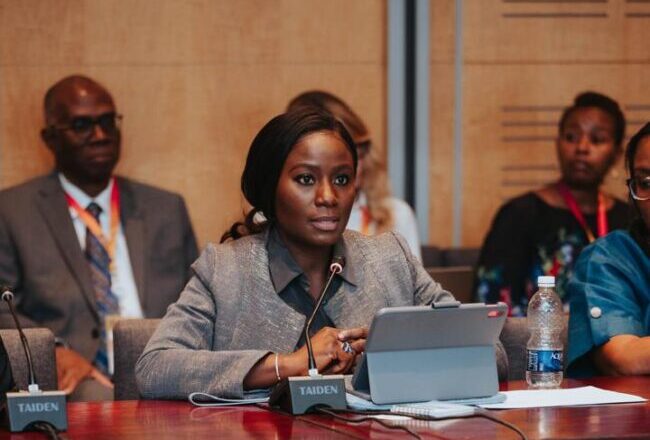African governments have been urged to look beyond traditional places and welcome a new crop of talent, especially women and young people, as a way to shape tomorrow’s African energy workforce.
Such talented women and young people, the Special Adviser on Energy to the President, Mrs Olu Arowolo Verheijen, said should be those who possess a global perspective, reach and understand the context of the 21st century, and are equipped with the fresh perspectives and bold energy to design and implement radical new solutions to lingering problems.
The special adviser gave this suggestion in her opening address at the African Energy Week in Cape Town, South Africa, themed “The Future of Energy: Shaping the Workforce of Tomorrow.”
Justifying her suggestion, the special adviser explained that Africans were at a point in their developmental process where energy access is critical in shaping the continent’s future.
According to her, despite the abundant resources (including renewables), over 75 per cent of the population lacked sufficient energy access.
She is of the opinion that as the continent is seeking to change this narrative, it’s high time to ensure that energy ceases to be the limiting factor in the continent but rather becomes a tool for driving industrialization and development.
She pointed out that one of the ways to address this is through a productive energy workforce.
She said, “There is no doubt that the future we are moving into will be very different from where we are coming from and what we are used to. It will take incredible amounts of human energy and a diversity of talent and expertise to enable us to adapt to these rapidly evolving and often unpredictable scenarios and circumstances.
“We are the ones who will determine the outcome of the delicate balance between energy security, affordability, and sustainability for this continent.”
“I am here today to make the argument that one of the most important ways in which we shape tomorrow’s African energy workforce is to look beyond the traditional places and welcome a new crop of talent, especially women and young people, who possess a global perspective, reach and understand the context of the 21st century, and are equipped with the fresh perspectives and bold energy to design and implement radical new solutions to lingering problems.”
“While efforts to attract women into STEM and the energy sector are important, attraction alone isn’t enough; retention and advancement to senior levels are equally crucial.
“The real differentiator for women breaking through from mid-level to executive roles is sponsorship. Women need powerful advocates who actively support their growth, position them for opportunities, and ensure their representation at the highest levels,” she said.
She narrated how President Tinubu selected her, and she ended up as the special adviser on energy, overseeing the design and coordination of reforms in the oil, gas, and power sectors from the president’s office.
“The President saw my capacity and competence, but even more importantly, he saw that I was bringing a unique experience—young, multifaceted, global, adventurous, disruptive,” she said.
Listing the achievements since assuming office over 12 months ago, she said her team has been able to clarify the regulatory roles to create an enabling environment for investments; introduced reforms targeted at reducing high operational costs and project execution timelines; and introduced a clear set of fiscal incentives for non-associated gas and deep offshore oil & gas exploration and production.
“This is the first time that Nigeria is outlining a fiscal framework for deep water gas since basin exploration commenced in 1991.
“Nigeria’s Petroleum Industry Act took twenty years to be passed into law and given presidential assent in 2021. We are now building on that foundation with an unprecedented sense of urgency to completely rewrite the narrative of oil and gas investment in Nigeria. We are already seeing the fruit of our work. Regulatory approvals are being expedited; major upstream investment decisions are being finalised,” she said.
Besides, the special adviser said that her team has been able to unlock over $1 billion in investments across the value chain, adding that by the middle of 2025, she expects to see FID on two more projects, including a multi-billion dollar deepwater exploration project, which will be the first of its kind in Nigeria in over a decade.
She said, “We see the abundant opportunities that lie ahead. We see Nigeria as a leading global producer and exporter of energy, whether it’s fossil fuels or renewables. We are not held back by the outdated approaches and assumptions of the past. We are open, daring, and eager to leave a legacy that will stand the test of time.”
“This is a story of sponsorship—a story of a veteran politician who has run Africa’s largest city economy and is now running Africa’s most populous country. A man who is himself from a professional background in energy, taking a bet on a woman to lead the team to deliver his vision—the boldest energy sector reforms Nigeria has seen in decades.
“This is about going beyond the usual lip service about inclusiveness and commitment to empowering women and young people, and my team does not take this privilege and opportunity for granted at all.
“Because of this landmark bet on us, we are determined and pour everything into ensuring that this presidency ends up far more consequential in reforming and repositioning Nigeria’s energy sector than any other presidential administration since democracy returned to Nigeria twenty-five years ago. And this is something that many more leaders on the African continent must do, going forward, and with a sense of urgency also,” the special adviser on energy said.
ALSO READ THESE TOP STORIES FROM NIGERIAN TRIBUNE
Get real-time news updates from Tribune Online! Follow us on WhatsApp for breaking news, exclusive stories and interviews, and much more.
Join our WhatsApp Channel now
